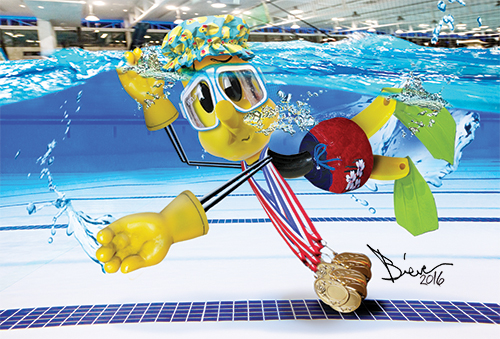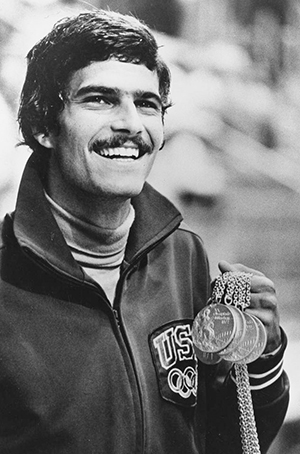 With the Summer Olympic Games in Brazil now over, here’s a look back at one of the most incredible Olympic performances of all time: Indiana University’s Mark Spitz winning seven gold medals while setting seven world records in 1972.
With the Summer Olympic Games in Brazil now over, here’s a look back at one of the most incredible Olympic performances of all time: Indiana University’s Mark Spitz winning seven gold medals while setting seven world records in 1972.

Electric co-op mascot Willie Wiredhand says Indiana University swimmer Mark Spitz must have been a remarkable Olympian to set seven world records with all those heavy gold medals around his neck!
Mark Spitz was already setting world records as a high school swimmer in California when the brash 18-year-old predicted he’d win six gold medals in the 1968 Summer Olympics in Mexico City. When he won only two, both in team relay events, Spitz took an accounting of himself and his training.
He then made what he’d later say was the biggest and best decision of his life. He decided to attend Indiana University and train in Bloomington under legendary swim coach James “Doc” Counsilman.
At the time, IU was the dominant power in college swimming. IU won six consecutive NCAA swim team championships (1968-73) and 20 consecutive Big Ten championships (1961-80). Counsilman, who died at age 83 in 2004, is still widely regarded as the greatest swimming coach of all time and is credited with revolutionizing the sport. Spitz has said Counsilman was the architect of the “10 commandments of swimming.”
At IU, Spitz continued setting world records and won eight individual NCAA titles. He was named World Swimmer of the Year in 1969, 1971 and 1972. By the spring of 1972, when he graduated from IU, he was ready for that summer’s Olympiad which began in late August in Munich, West Germany. This time, he made no predictions; his swimming did the talking.
His amazing string of seven gold medals and seven world records began Aug. 28, 1972, with an easy victory in the 200-meter butterfly. That same night, he won his second gold as a member of the USA 4×100-meter freestyle relay team.
Over the next week, he’d win his third gold in the 200-meter freestyle; his fourth in the 100-meter butterfly; his fifth anchoring the 4×200-meter freestyle relay; and his sixth in the 100-meter freestyle. Finally, on Sept. 4, 1972, his seventh gold came in the 4×100-meter medley relay.
Three quarters of the 4×200 relay team consisted of IU swimmers, while the other two relays included one other IU swimmer.
Just hours after Spitz won his seventh gold, his accomplishments were overshadowed. In the predawn hours of Sept. 5, eight Palestinian terrorists broke into the Olympic Village apartments housing members of Israel’s team. They killed two Israeli team members and took nine hostage. The next day, arrangements were made to fly the terrorists and their hostages out of Munich. Tragically, all nine Israelis were killed by the terrorists during a botched rescue attempt by the West German military at the airport. A West German police officer was also killed, as were five of the eight terrorists.
As the crisis was unfolding, Spitz, the most famous Jewish athlete at the Olympiad, and another Jewish member of the U.S. team were quickly led by armed escorts to the airport and flown to London for fear they, too, might be terrorist targets. While Spitz was finished with his events, he missed the closing ceremonies Sept. 10 after the games resumed under a pall of sadness.
Though just 22 at the time, Spitz retired from swimming after the 1972 games. At age 41, he attempted a comeback for the 1992 Summer Olympics but just missed qualifying.
Stay tuned each month as Willie presents more Indiana “Bicentennial Zingers.”




